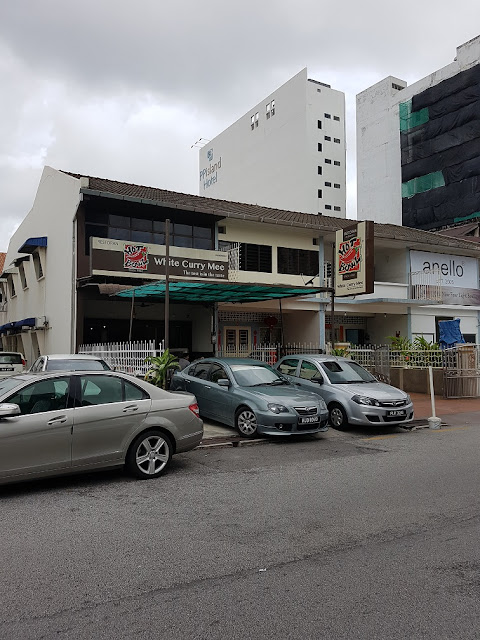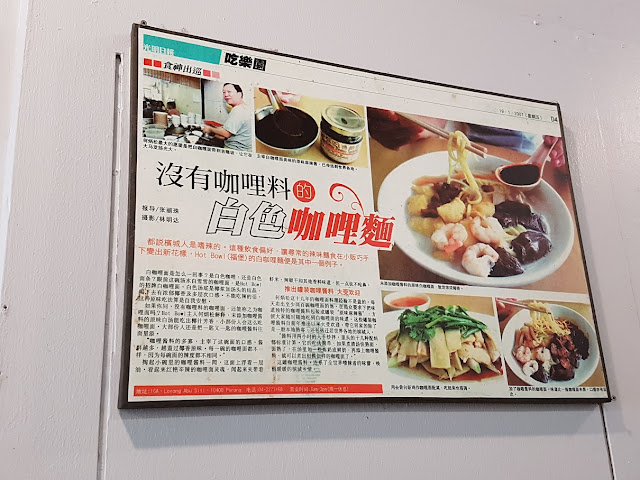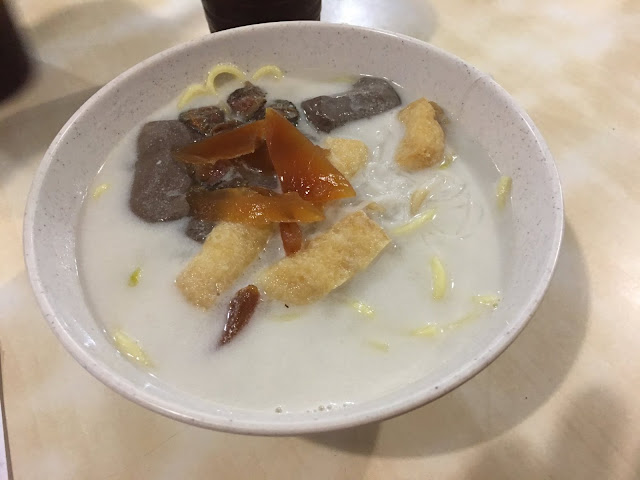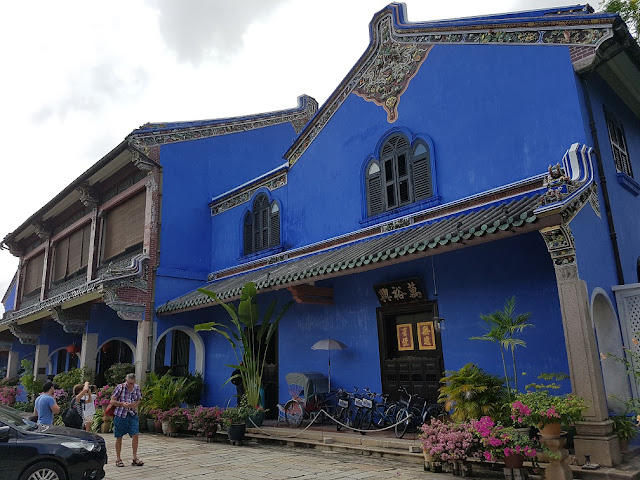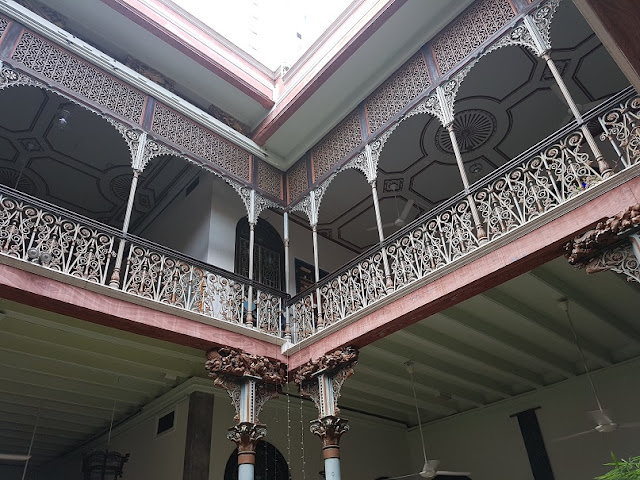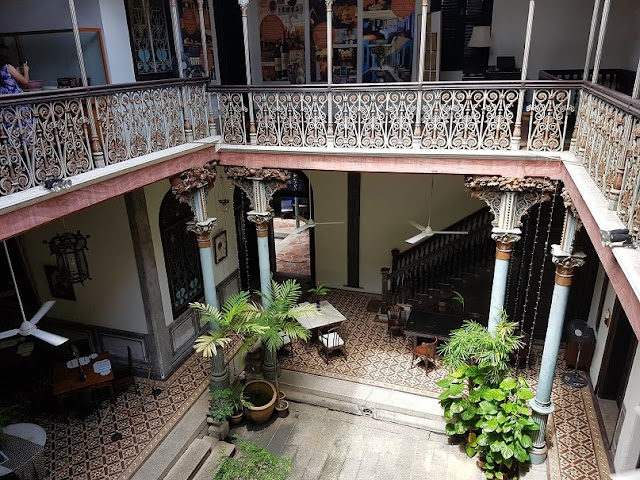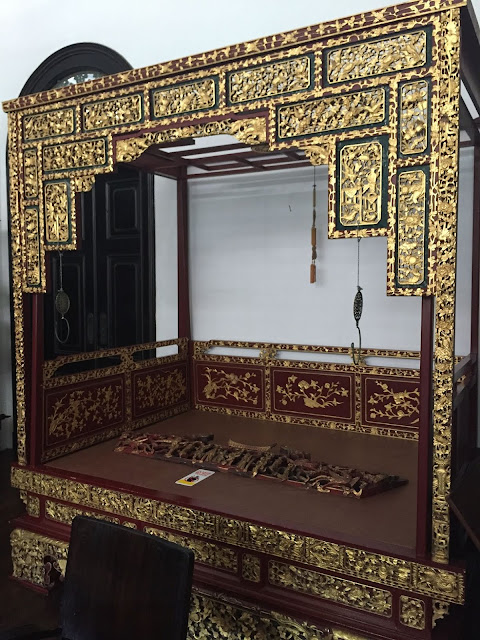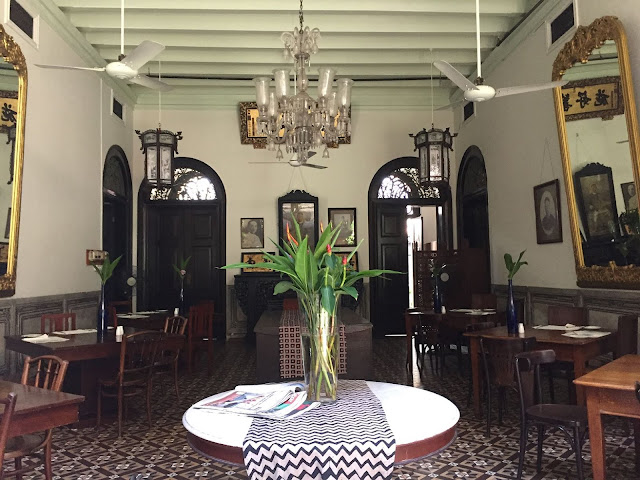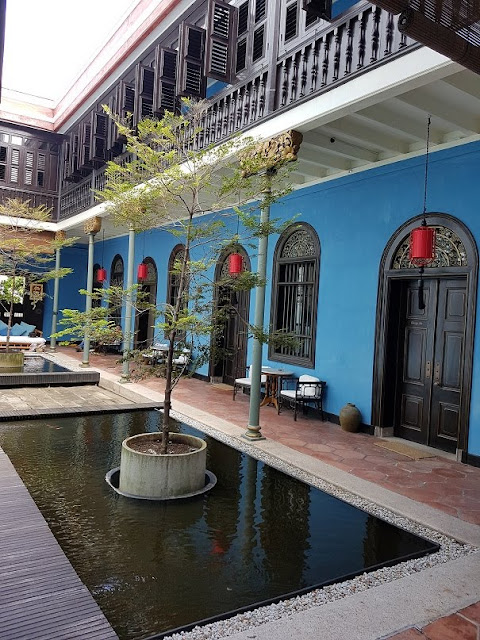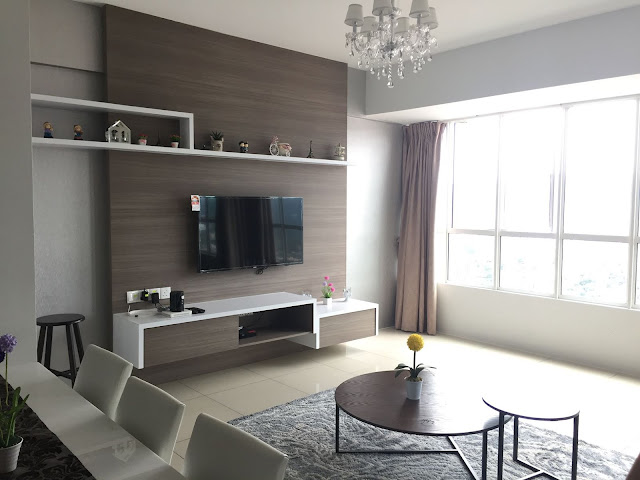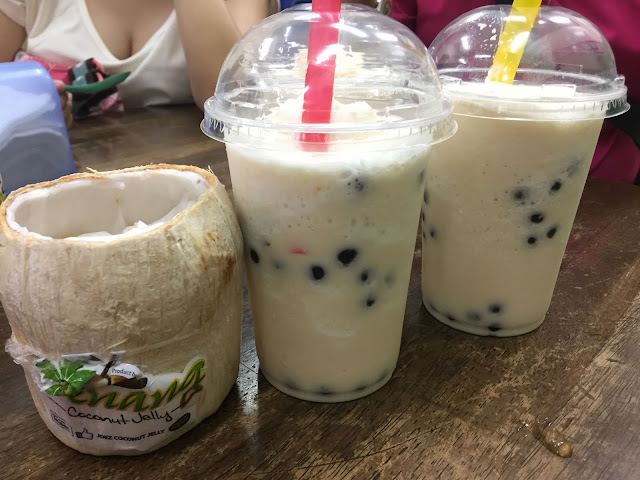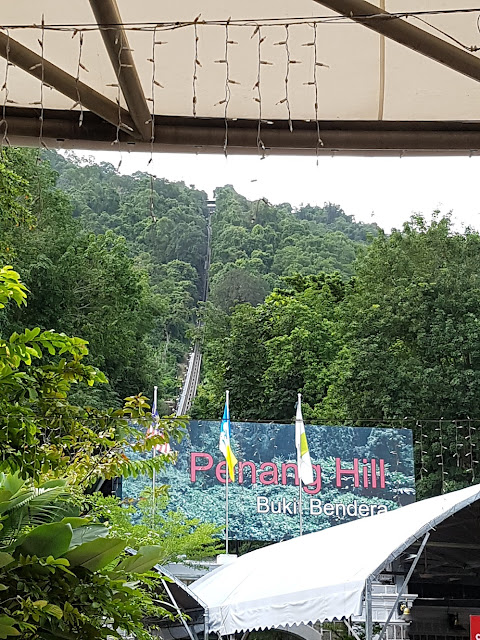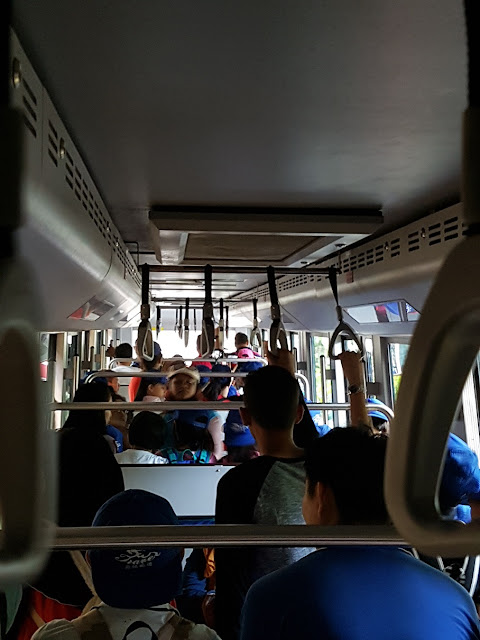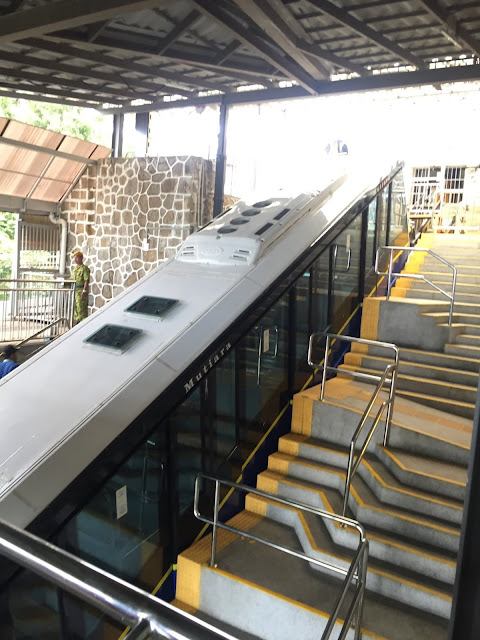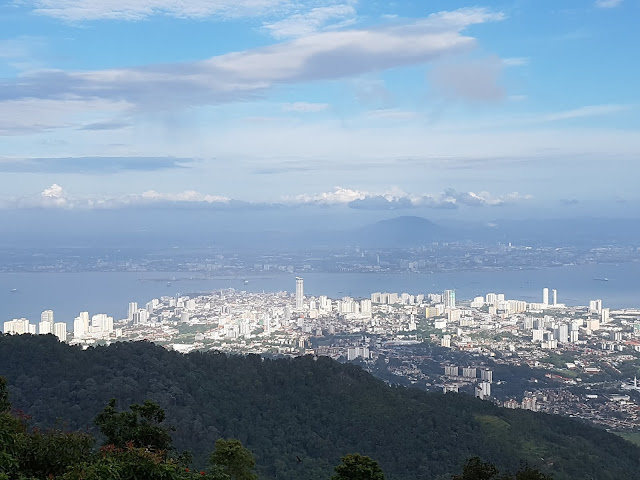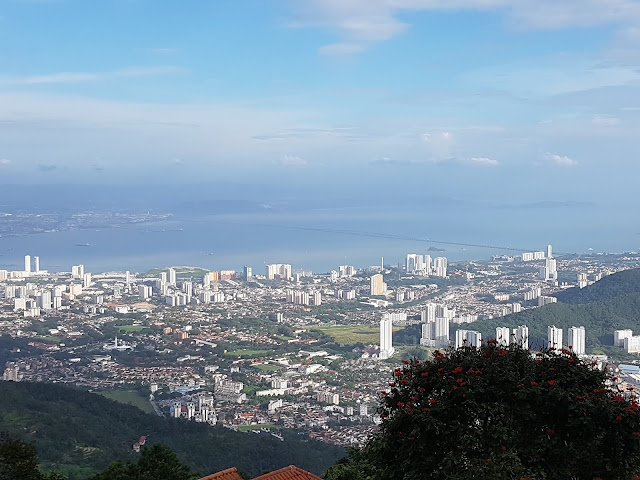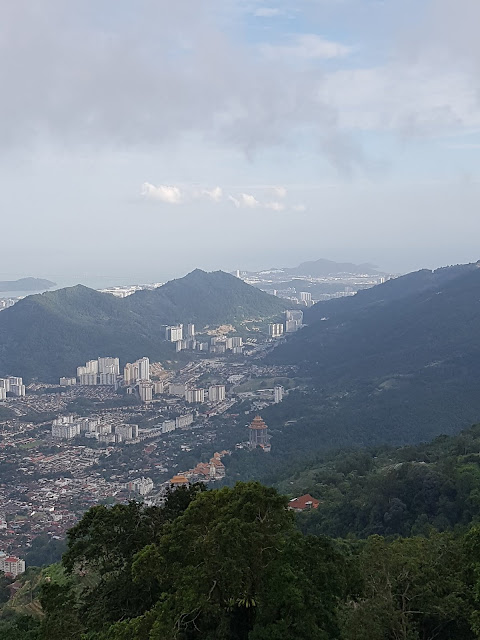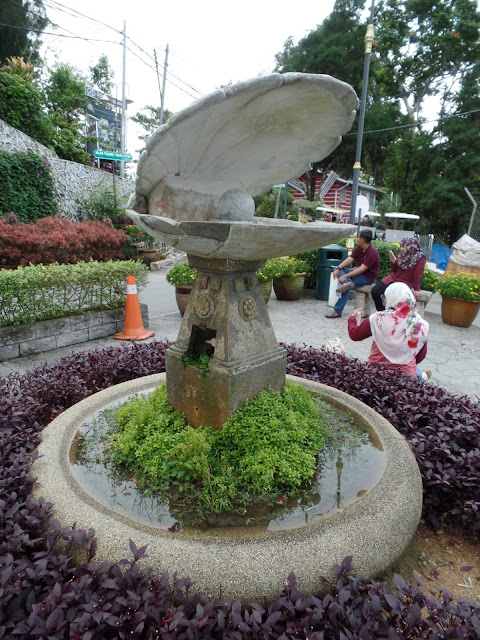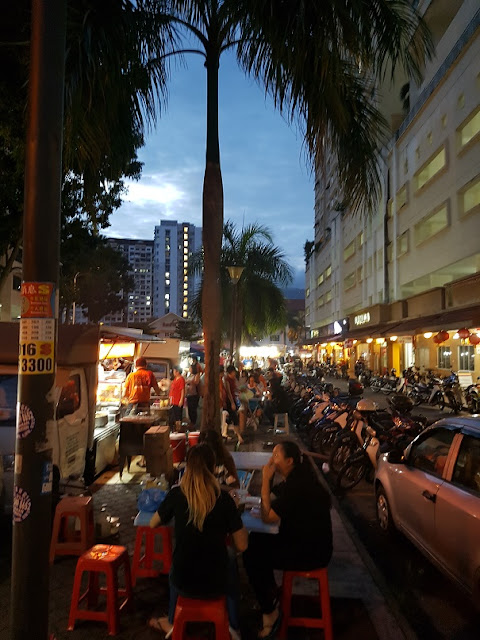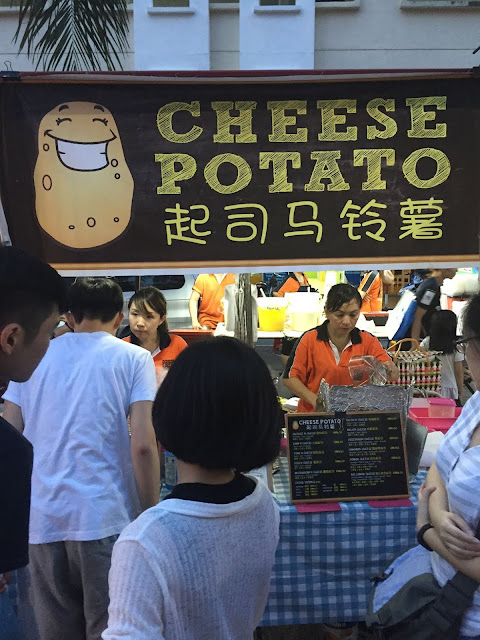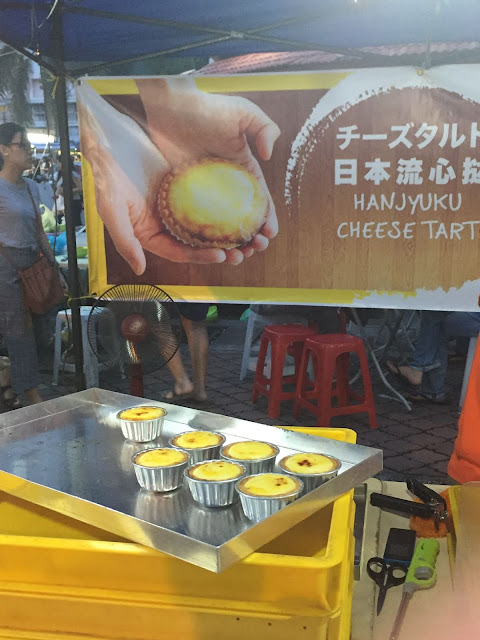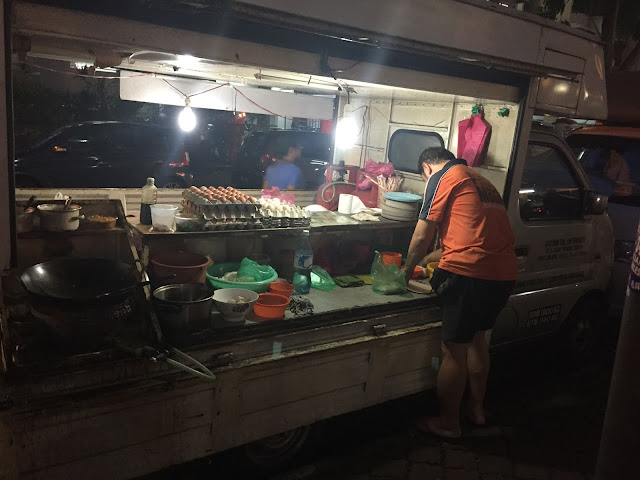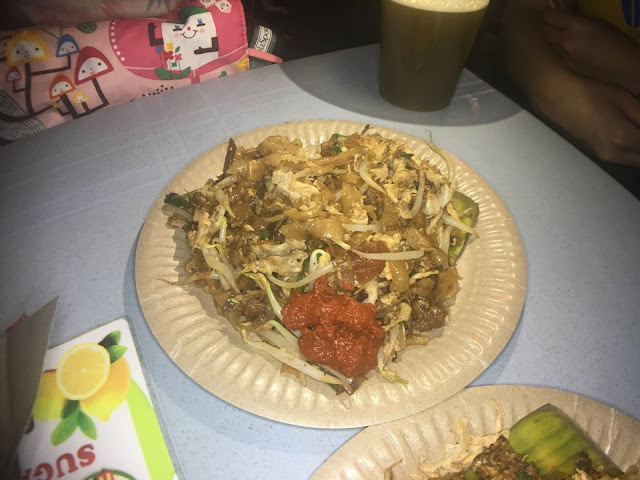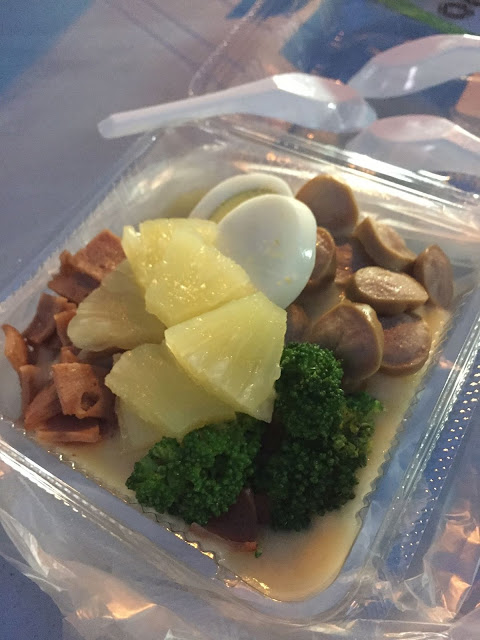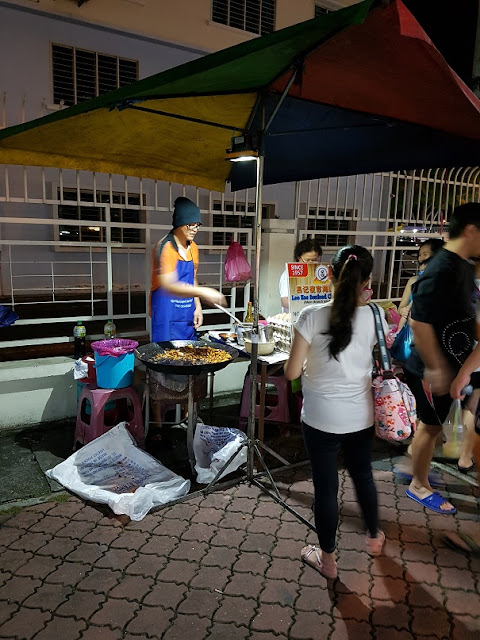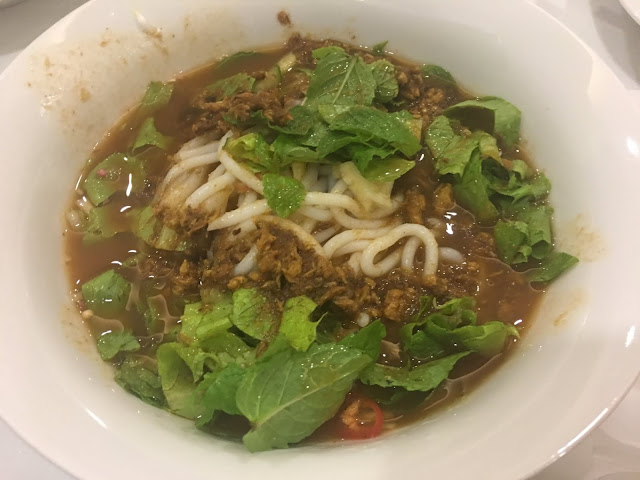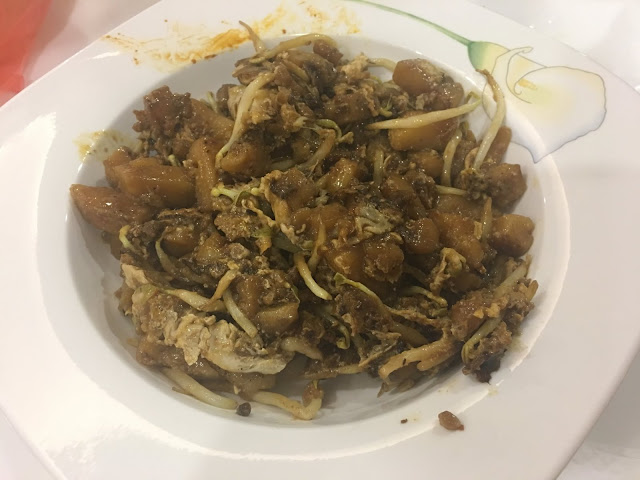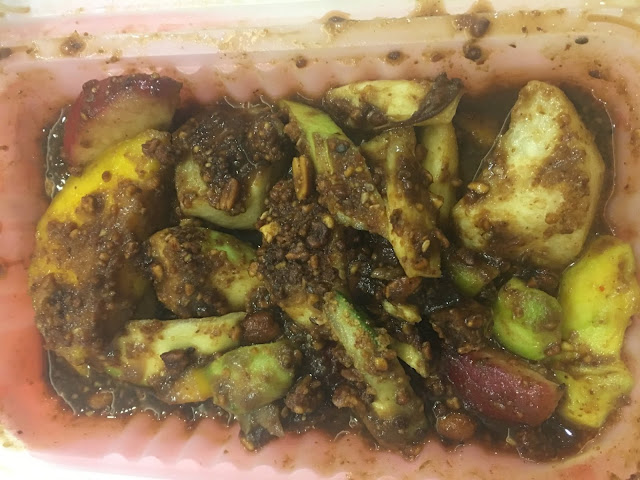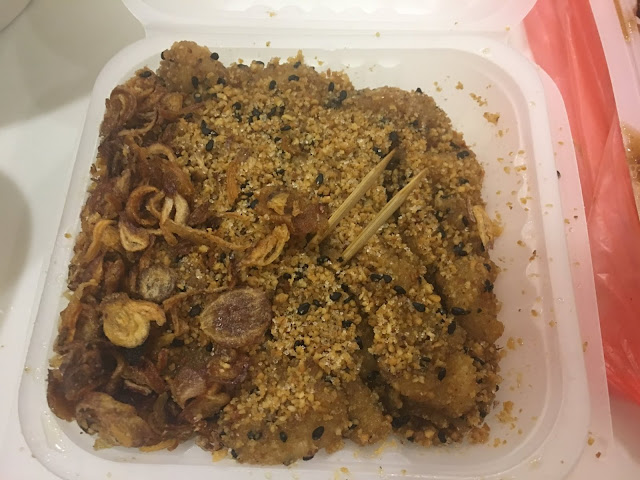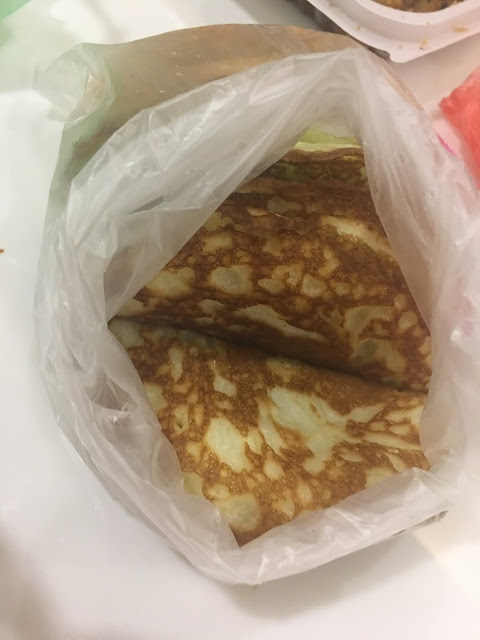The following morning after we washed up, it was time for another eventful day. We made the arrangement with our driver to pick us for breakfast first.
Chok Kee Porridge Cafe (粥記咖啡店) @ Lebuh Kimberley
Chok Kee Porridge Cafe (粥記咖啡店) @ Lebuh Kimberley
We paid a visit to this famous porridge shop, Chok Kee Porridge Cafe (粥記咖啡店), for our breakfast.
 |
| Chok Kee Porridge Cafe |
This place is certainly popular as we could see constant stream of local patronage either eat-in or take away. The shop sells only porridge, and to be exact only 3 types of porridge, Pork Intestine Porridge, Century Egg Porridge and Peanut Porridge. We ordered all 3 types of porridge and coffee and tea as the beverage.
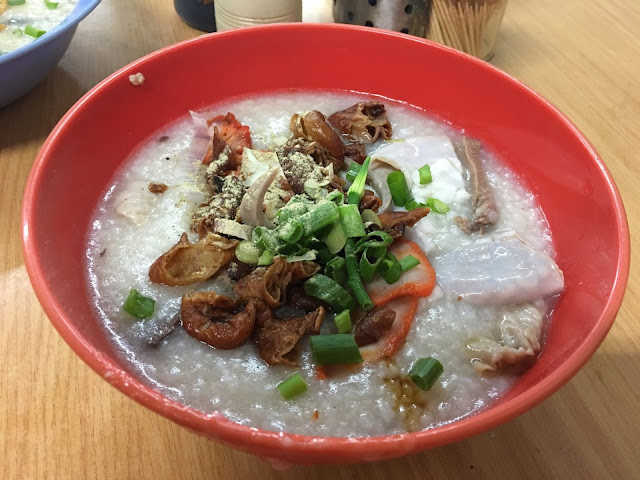 |
| Pork Intestine Porridge |
 |
| Century Egg Porridge |
 |
| Peanut Porridge |
The Pork Intestine Porridge is their specialty here, which is served with char siew, pork stomach and 2 types of pork intestine, the normally cooked type and the fried type. The crispy and crunchy fried pork intestine adds on a different taste to the silky porridge. For those who are not a fan of pig innards, the more typical Century Egg and Peanut Porridge would be the alternative. We also added you tiao (fried dough stick) to the porridge, which are separately chargeable. After the breakfast, we departed for Kek Lok Si Temple (極樂寺) at Air Itam.
Kek Lok Si Temple (極樂寺)
Kek Lok Si Temple (極樂寺)
Kek Lok Si (極樂寺) is a Buddhist temple built more than 100 years ago, and is located along the Air Itam hillside. It is currently the most well-known and visited temple in Penang. The temple contains several halls, housing statues of Guanyin (Goddess of Mercy), Buddha and many other Chinese gods. Architecturally, the seven storey high Pagoda of Rama VI and the 30 metres tall bronze statue of Guanyin are the most striking attraction of Kek Lok Si Temple (極樂寺).
We arrived the carpark after winding through the hill. From there, we walked past a few shops before reaching an open space. There's a few Buddha statues and one could also see the Pagoda of Rama VI on top of the hill, making it a good backdrop for photo taking for many of the visitors. The Pagoda of Rama VI stands out architecturally, with its unique blend of Chinese, Thai and Burmese architectural styles.
We arrived the carpark after winding through the hill. From there, we walked past a few shops before reaching an open space. There's a few Buddha statues and one could also see the Pagoda of Rama VI on top of the hill, making it a good backdrop for photo taking for many of the visitors. The Pagoda of Rama VI stands out architecturally, with its unique blend of Chinese, Thai and Burmese architectural styles.
 |
| Kek Lok Si Temple |
We followed the pathway uphill and passed by several prayer halls. Surrounding the area are many more Buddha statues and gardens with colourful flowers. One could really feel the peacefulness and tranquillity when walking around the area.
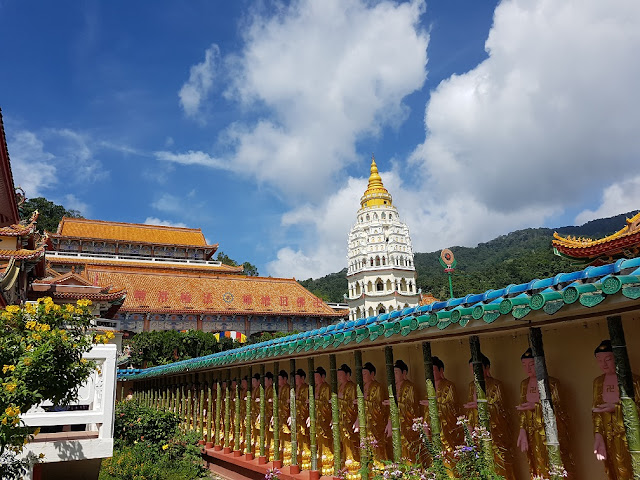 |
| View of the towering Pagoda of Rama VI at the background |
 |
| Flower bed in front of the row of Buddha statues |
We followed the signage towards the Guanyin bronze statue, which led us to a big souvenir shop. This is where we bought the tickets to board the inclined elevator, which would bring us to a higher level where the statue is located.
 |
| Inclined elevator to see the giant Guanyin statue |
Upon reaching the top, we could see the majestic 30 metres tall Guanyin statue sheltered under a pavilion. There's a tent in front of the statue, where some souvenirs were sold. Visitors could also pay a small sum to buy the wishing ribbon to pray for their wishes.
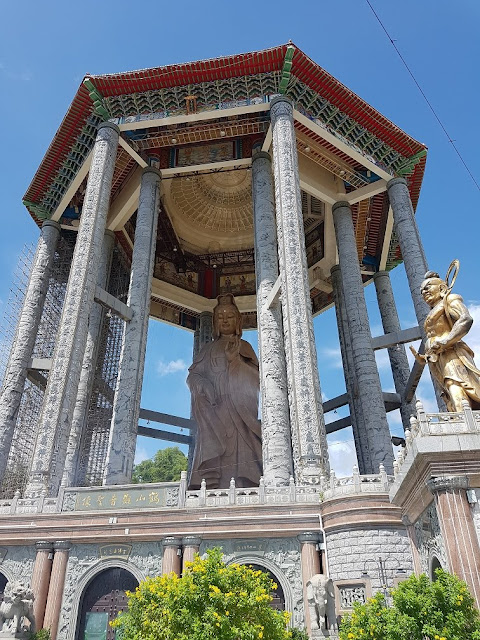 |
| The giant Guanyin statue |
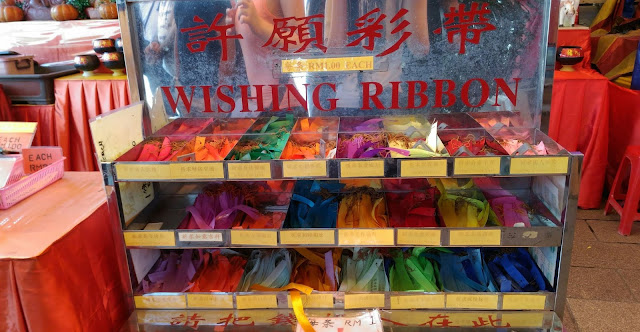 |
| Wishing Ribbon for purchase |
Within the vicinity, there's also a park and a large square, where it offers a great view of Air Itam and George Town.
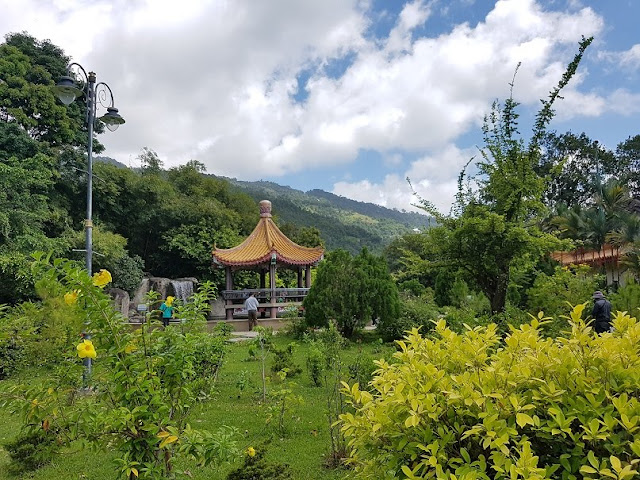 |
| Pavilion at the park |
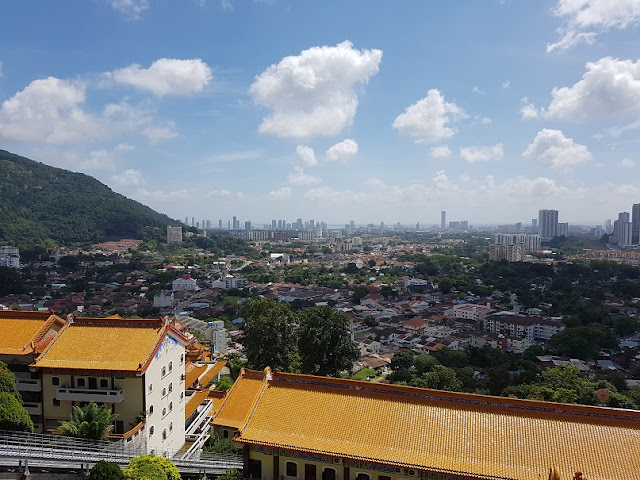 |
| Unobstructed view of Air Itam and George Town |
We took the inclined elevator back to the souvenir shop and decided to leave the temple after some souvenir shopping.
Pasar Air Itam Laksa (亚依淡巴刹叻沙) @ Jalan Pasar
Pasar Air Itam Laksa (亚依淡巴刹叻沙) @ Jalan Pasar
It was close to lunch time after the temple visit. Since we were already in Air Itam, we could not miss the opportunity to eat the famous Pasar Air Itam Laksa (亚依淡巴刹叻沙). The stall is located not far away from Kek Lok Si Temple (極樂寺), along the road towards its entrance.
 |
| The famous Pasar Air Itam Laksa stall |
Our driver dropped us directly in front of the stall. The place was full of lunch time crowd and we could not find any empty seats for our large group. One of the Laksa stall employee managed to find us a table at the small hawker centre located opposite across the road.
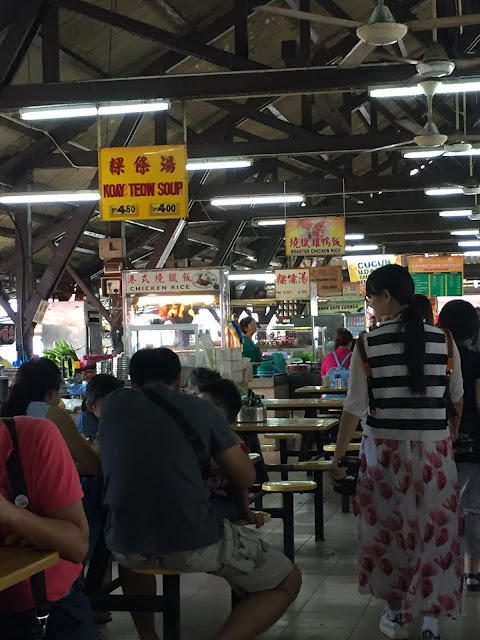 |
| Small hawker centre opposite the Laksa stall |
We ordered 2 bowls of Laksa, and other food from nearby stalls, such as Lor Bak (also known as Ngoh Hiang), fried spring rolls and Koay Teow Soup.
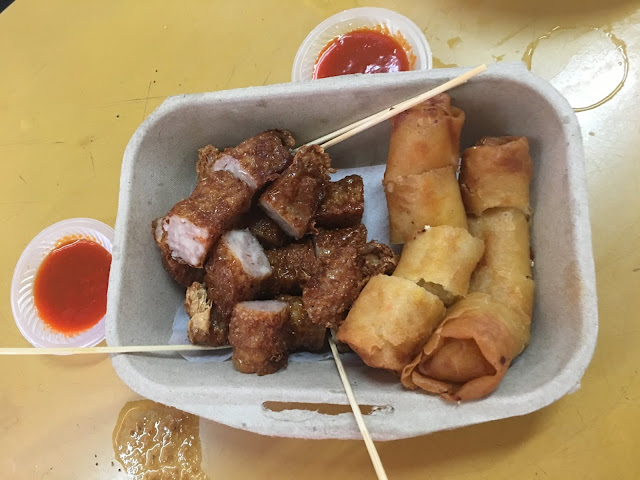 |
| Lor Bak and Fried Spring Rolls |
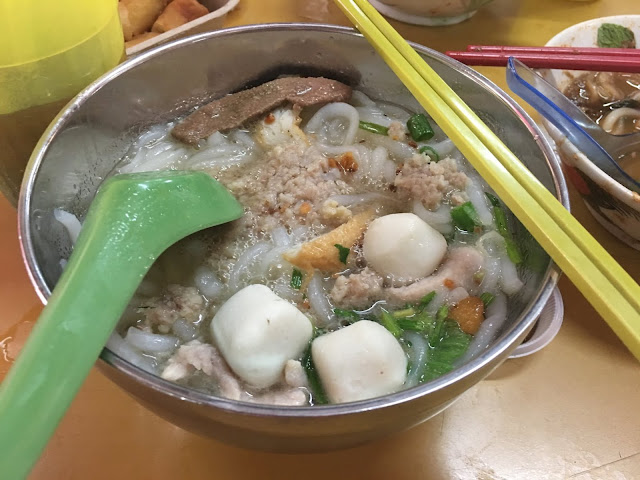 |
| Koay Teow Soup |
All the food we had ordered taste good, but the Asam Laksa was still the highlight.
 |
| Pasar Air Itam Laksa |
The Laksa soup is sweet, sour and spicy, served with rice vermicelli and other ingredients like onion, mint leaves, chili, and most importantly, the small chunks of mackerel fish. When everything is mixed together, the overall taste is delicious and flavourful. After the meal, we walked around other shops located near the road junction while we waited for our driver to pick us up.
Ah Leng Char Koay Teow (亞龍炒粿條) @ Jalan Dato Keramat
 |
| Road junction by the Pasar Air Itam |
 |
| Street of Air Itam with Penang Hill at the background |
Ah Leng Char Koay Teow (亞龍炒粿條) @ Jalan Dato Keramat
Well, as we were a large group, the previous meals were not sufficient to keep us full. We went on the food hunt again, which we got the driver to bring us to eat the Ah Leng Char Koay Teow (亞龍炒粿條), one of the popular Char Koay Teow stall in Penang. The stall is located in front of Restoran Tong Hooi, which is visible from the main road.
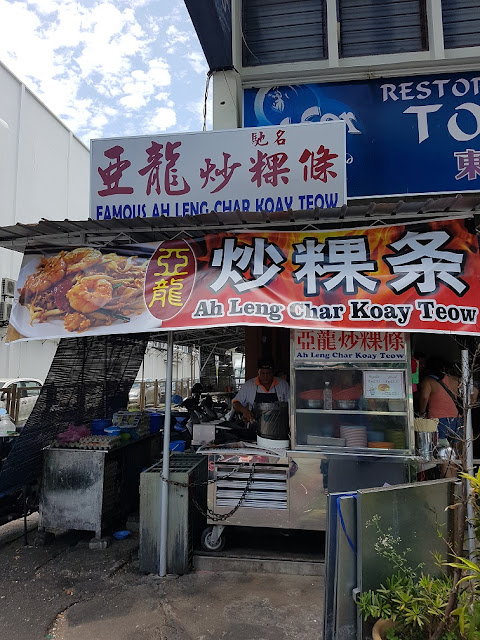 |
| Ah Leng Char Koay Teow |
The coffee shop sells other food too, but I could see most people were eating the Char Koay Teow. We ordered 2 plates of Char Koay Teow, one with mantis shrimp added and the other without. We also requested duck egg (instead of the normal chicken egg) for both the plates. The serving was quite small, but the prawns they provided were big and fresh. The chili and the duck egg was good and gave the overall dish an additional flavourful taste.
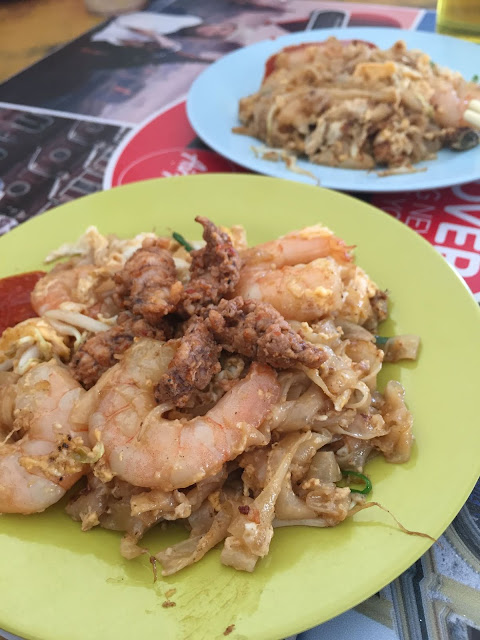 |
| Char Koay Teow with duck egg and mantis shrimp |
It did not take us too long to finish the 2 plates of Char Koay Teow. After the meal, our driver picked us up to the next destination for dessert.
Penang Road Famous Teochew Chendul (槟城律驰名潮州煎蕊) @ Lebuh Keng Kwee
Penang Road Famous Teochew Chendul (槟城律驰名潮州煎蕊) @ Lebuh Keng Kwee
We went to Lebuh Keng Kwee next to have the Penang Road Famous Teochew Chendul (槟城律驰名潮州煎蕊). This place is indeed popular, as there was a very very long queue in front of the stall when we were there.
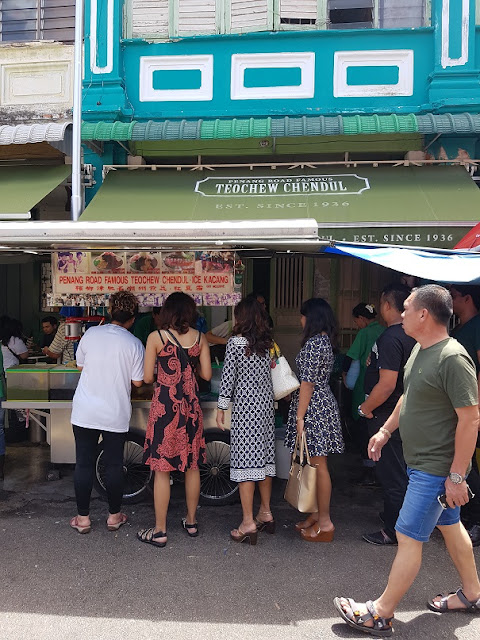 |
| Penang Road Famous Teochew Chendul |
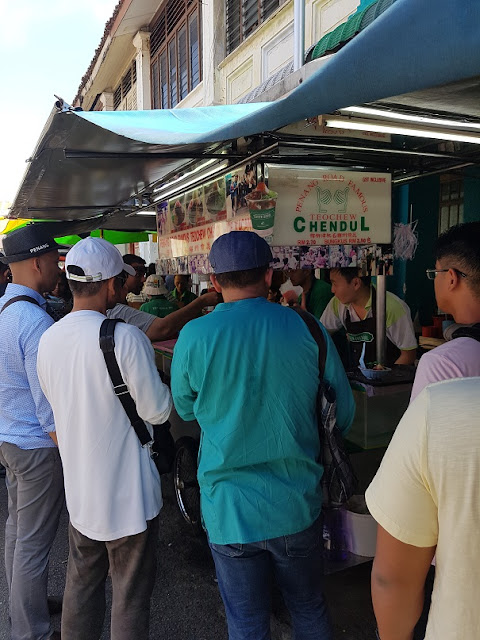 |
| Staff busy making Chendol |
There was also no place to sit in their shops, but luckily, we found an empty table sheltered under a tent located at the open space opposite the Chendol stall. A few of us joined in the queue to buy the Chendol, while we also ordered Orh Luak (oyster omelette) from a nearby stall. Despite the long queue, the turnaround time was still decent and we soon got our Chendol. The Chendol comes with a generous serving of green jelly and red beans, with the icy cold coconut milk with black sugar a good way to relieve the heat in the hot afternoon.
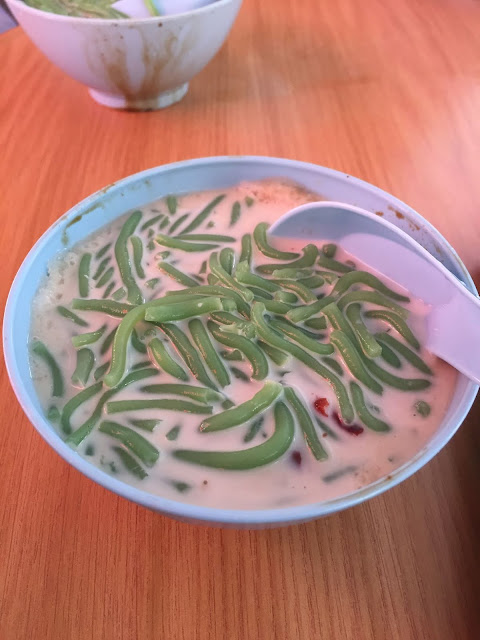 |
| Chendol |
The Orh Luak, despite not the highlight here, also tasted good. There's a lot of small oysters in the serving and they were fresh.
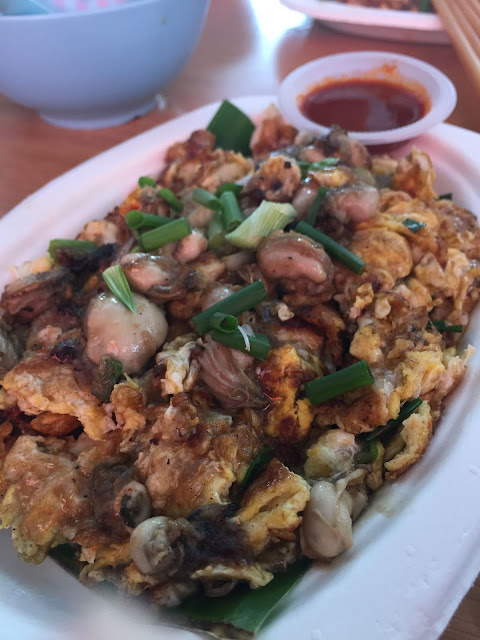 |
| Orh Luak (Oyster Omelette) |
We were really full after a succession of food and dessert. We moved on to the next activity that would help our digestion, the famous Penang Street Art Murals Walking Trail.
Penang Street Art Murals
Penang Street Art Murals
In 2012, Lithuanian artist, Ernest Zacharevic, was invited to Penang in conjunction with the George Town Festival to create the murals on the walls of the old buildings located at different parts of the city centre. After this, many other local artists also joined in to add on numerous murals and steel rods sculptures now scattered at many different locations and streets. Some of the murals are already faded and fast disappearing under the weather, thus it is advisable for visitors to visit them soon before they are gone. For us, it wasn't the intention to cover all the murals, as it would require a lot time and leg power to do so. We had a "Mural Map" (compiled by online bloggers) with us, which we downloaded from the Internet, and tried to cover the more popular murals within our means.
Our driver dropped us at the junction of Lebuh Armenian and Jalan Masjid Kapitan Keling, which we could already see quite a number of tourists around. We walked down Lebuh Armenian, which many of the shop houses are converted to backpacker hostels, cafes, souvenir and boutique shops.
Our driver dropped us at the junction of Lebuh Armenian and Jalan Masjid Kapitan Keling, which we could already see quite a number of tourists around. We walked down Lebuh Armenian, which many of the shop houses are converted to backpacker hostels, cafes, souvenir and boutique shops.
 |
| A steel rod sculpture along Lebuh Armenian |
The first mural we encountered was the "Magician", which is drawn on the shutters of a bicycle rental shop, depicting a magician and a frightened girl.
 |
| "Magician" mural on the right shutter |
Just a couple of steps further down, we could find 3 more murals ("Lion Dance", "Three Chinese Dolls" and "Kah Lu Kong Hokkien") on the walls of a purple colour building.
 |
| A group of visitors in front of the mural "Lion Dance" |
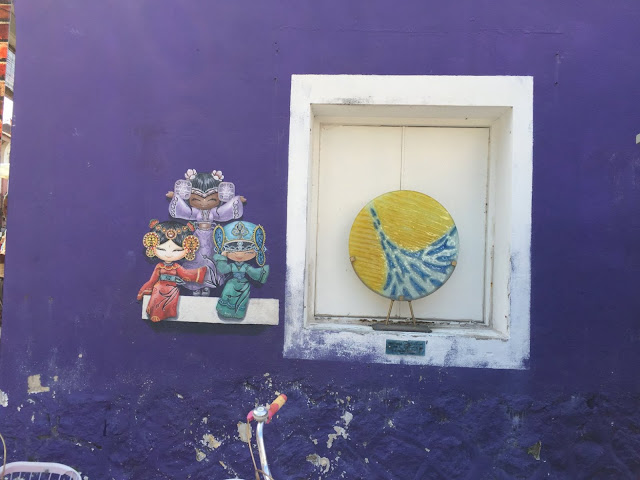 |
| "Three Chinese Dolls" |
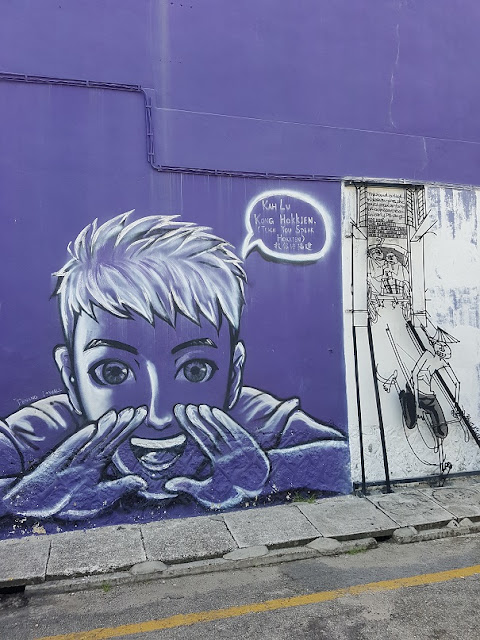 |
| "Kah Lu Kong Hokkien" |
Further down the street, we could find this mural "I Can Help Catch Rats" hidden at the entrance towards a small alley. This mural is actually part of the local 101 Lost Kittens Project to raise public awareness about stray animals.
 |
| "I Can Help Catch Rats" |
As we approached the end of the street, we saw many tourists gathered around the area. This is the location of the most famous and photographed mural, "Little Children on a Bicycle", which was painted by Ernest Zacharevic. This mural shows a little girl and boy riding a "real" bicycle. Most visitors would pose behind the boy, as if the three are riding on the bicycle.
 |
| "Little Children on a Bicycle" |
After this, we turned left along Beach Street and within the compound of Cheah Kongsi, we saw another mural known as "Cats in Procession". It shows many cats in a religious ceremonial procession.
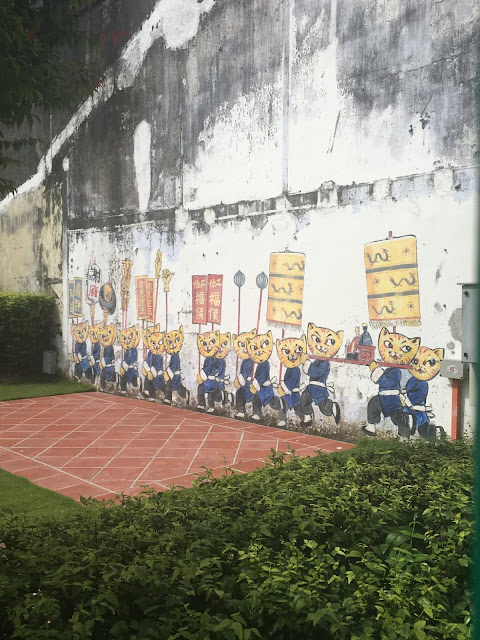 |
| "Cats In Procession" |
After this, we turned into the neighbouring street, Lebuh Ah Quee. The first encounter was the mural "Only You Can Stop Air Pollution". There are several cigarette butts stinking out of the wall and a person wearing a gas mask. The message has been partially painted over by someone.
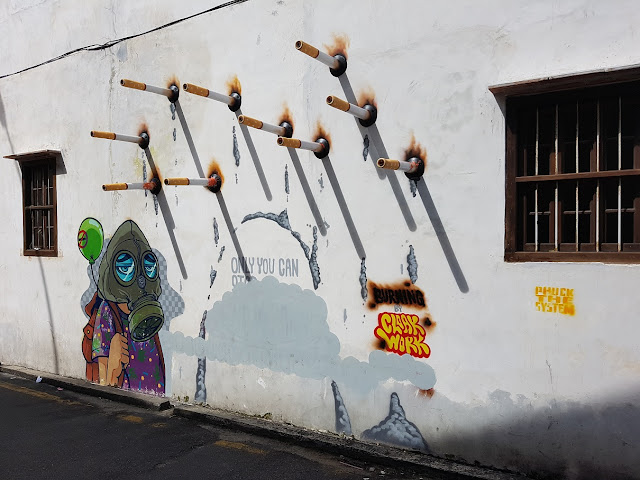 |
| "Only You Can Stop Air Pollution" |
Just a few more steps away is another 3 murals. The first one is the "Boy on a Motorcycle" painted by Ernest Zacharevic. It is similar to the "Little Children on a Bicycle", where a boy is shown on a "real" motorcycle.
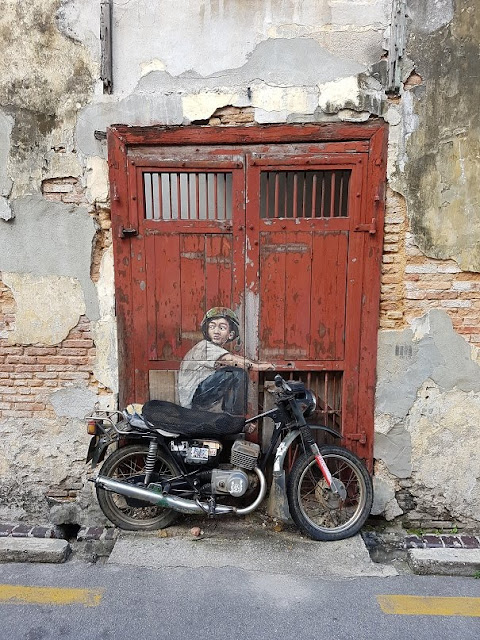 |
| "Boy on a Motorcycle" |
The second one is the "Little Boy with Pet Dinosaur", also painted by Ernest Zacharevic. It shows a little boy pulling his pet dinosaur.
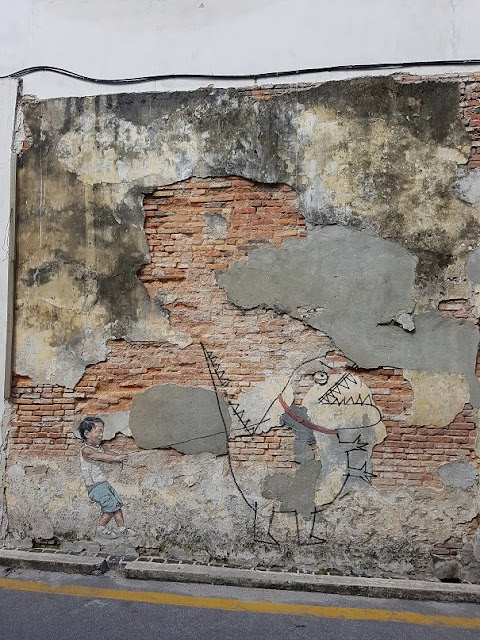 |
| "Little Boy with Pet Dinosaur" |
The third is the "Man in Malaysian Flag Shirt". It shows a man wearing a shirt bearing the Malaysian flag.
 |
| "Man in Malaysian Flag Shirt" |
Next, we turned into a small alley to the backyard area of the shop houses. Over here, we could see a few more murals, such as the "Real Bruce Lee Would Never Do This". It shows Bruce Lee with kungfu kick on a cat.
 |
| "Real Bruce Lee Would Never Do This" |
The others are the "Feed the Stray", which shows a piece of meat to be fed to the dog, and the "Pipe Elephant", which a real pipe is being depicted as the trunk of the elephant.
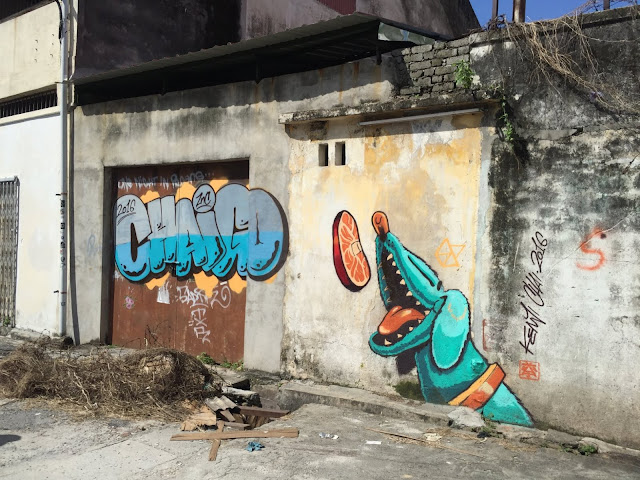 |
| "Feed the Stray" |
 |
| "Pipe Elephant" |
We exited to Lorong Pit and continued towards Lebuh King. We had ventured into the "Little India" of Penang, where the rows of shop houses are occupied by shops selling Indian apparels, spices, jewelry and CD shops. Over this area, there are no murals, but we could still see many steel rod sculptures along the way. These are collections of caricatures commissioned by the company, Sculpture At Work, which they depict the history and characteristics of George Town. We then turned left into Lebuh China and continued towards Lorong Stewart. The street of Lorong Stewart is much more quiet, where there are many cafes, restaurants and backpacker hostels. Near to the entrance of Lebuh Klang is another mural known as the "Indian Boatman".
 |
| "Indian Boatman" |
We then turned into Love Lane and ended the walking trail at Mugshot Cafe located along Lebuh Chulia.
Mugshot Cafe @ Lebuh Chulia
Gurney Drive Hawker Centre
 |
| A Steel Rod Sculpture along Love Lane |
 |
| An interesting Steel Rod Sculpture near the building window, along Love Lane |
Mugshot Cafe @ Lebuh Chulia
Mugshot Cafe is popular for its bagel muffins, along with the homemade yogurt that comes with various flavours. The cafe is modern, but still maintain its rustic looking, especially with the wooden furniture, tables and chairs.
It wasn't too crowded when we were there and we got a large empty table near the backyard, where there's an optometrist shop to our surprise. We did not order any food, just beverage like smoothies, coffee, tea and the yogurt. The shop also sells some wooden puzzles, which we played with some of the samples while enjoying the beverages. After the great fun with the puzzles and the long rest, we decided to leave for dinner.
 |
| Mugshot Cafe (Source: Photo from Trip101.com) |
Gurney Drive Hawker Centre
Gurney Drive Hawker Centre is located just beside Gurney Plaza and by the seaside. Along the way there, we also passed by many restaurants, shopping malls and several large hotels, such as G Hotel Gurney, and G Hotel Kelawai. Our driver dropped us directly in front of the hawker centre. It is an open-air space occupied with many tables, with the hawker stalls lined the sides. This place is definitely more touristy than the Jelutong Night Market we visited the previous night, with the food pricier and more crowded with many foreign tourists.
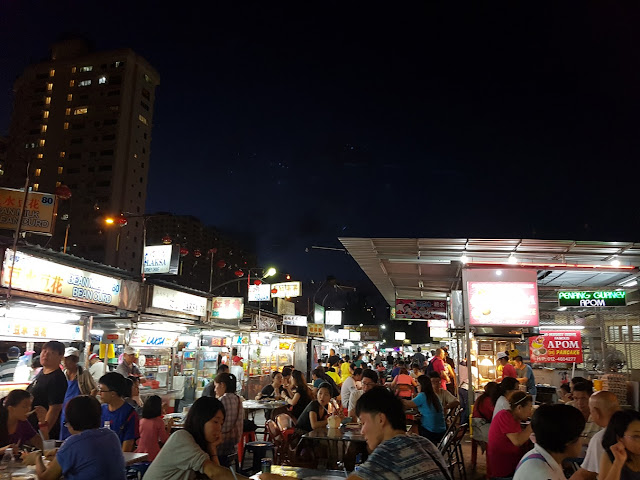 |
| Gurney Drive Hawker Centre |
We found an empty table somewhere in the middle of the hawker centre and most of us went separate ways to buy various food from different stalls. Eventually, we got a large spread of food to be shared among us, such as Wanton Mee, Satay, BBQ Sting Ray, Prawn Mee, Curry Mee and Lor Bak etc.
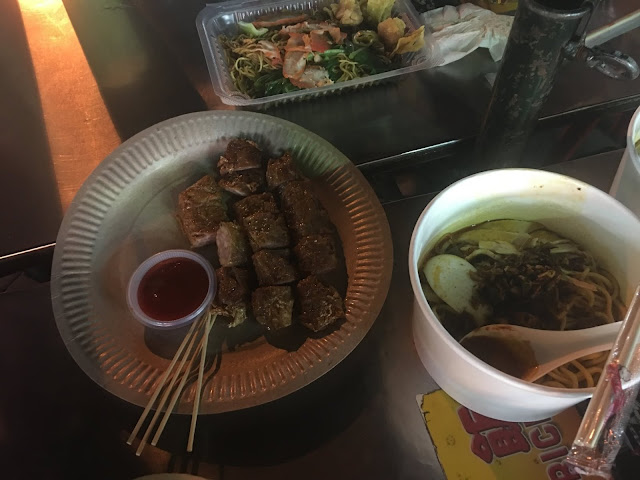 |
| Lor Bak, Prawn Mee and Wanton Mee |
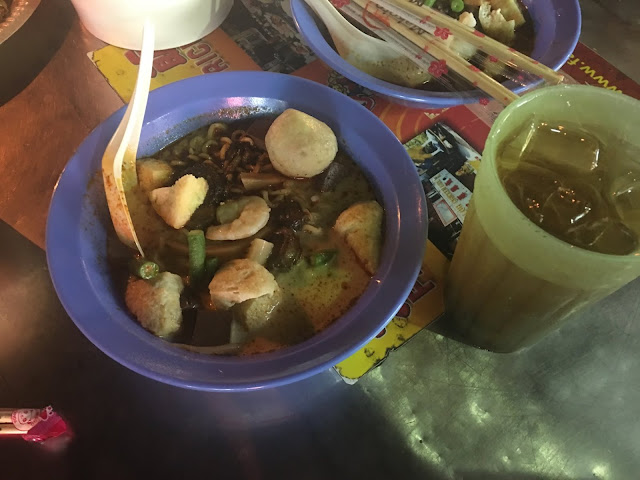 |
| Curry Mee |
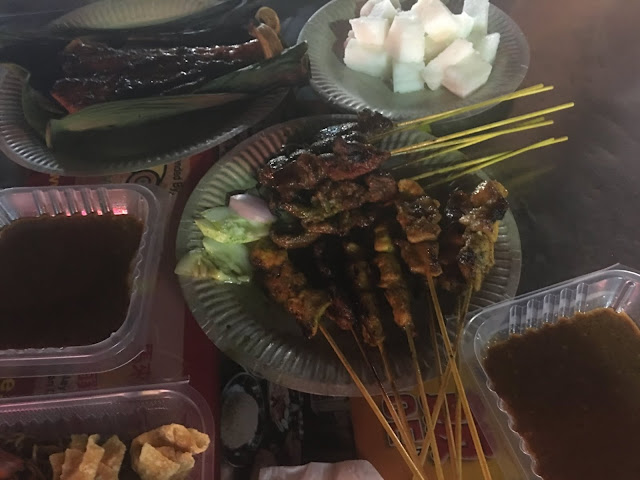 |
| Satay and BBQ Sting Ray |
Overall, I personally still felt that the food we had Jelutong Night Market taste better, although over here it provided more comfort to the visitors as we had a decent place to sit down to enjoy our meal. After the dinner, we just walked around in the Gurney Plaza before our driver picked us back to our apartment.
Follow the links below to the other days of my Penang tour:
Day 1: Hot Bowl White Curry Mee, The Blue Mansion, Joez Coconut Jelly, Penang Hill, Jelutong Night Market
Day 2: Chok Kee Porridge Cafe, Kek Lok Si Temple, Pasar Air Itam Laksa, Ah Leng Char Koay Teow, Penang Road Famous Teochew Chendul, Penang Street Art Murals, Mugshot Cafe, Gurney Drive Hawker Centre
Day 3: Jalan Transfer Roti Canai, Chew Jetty, Pinang Peranakan Museum, Perut Rumah Nyonya Cuisine
Follow the links below to the other days of my Penang tour:
Day 1: Hot Bowl White Curry Mee, The Blue Mansion, Joez Coconut Jelly, Penang Hill, Jelutong Night Market
Day 2: Chok Kee Porridge Cafe, Kek Lok Si Temple, Pasar Air Itam Laksa, Ah Leng Char Koay Teow, Penang Road Famous Teochew Chendul, Penang Street Art Murals, Mugshot Cafe, Gurney Drive Hawker Centre
Day 3: Jalan Transfer Roti Canai, Chew Jetty, Pinang Peranakan Museum, Perut Rumah Nyonya Cuisine

